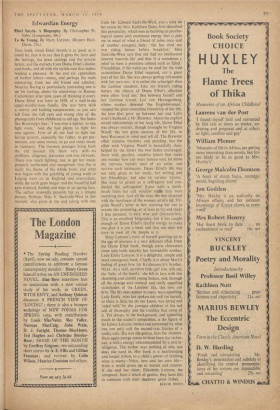Edwardian Energy
Ethel Smyth, A Biography. By Christopher St. John. (Longmans, 30s.) Tins book about Ethel Smyth is as good as it could be, that is to say that it gives the facts and the feelings, the press cuttings and the private letters, and the extracts from Dame Ethel's diaries and books, and all with the stylish ease that makes reading a pleasure. At the end are appendices of further letters—many, and perhaps the most interesting, from her old friend and admirer, Maurice Baring (a particularly interesting one is on his feelings about his conversion to Roman Catholicism after nine years of thinking it over). Dame Ethel was born in 1858, of a well-to-dp upper-middle.:class family. She was born with a stormy and battling temperament, as you can tell from the full eyes and strong chin of the photographs from childhood to old age. She looks like Browning's line : 'I was ever a fighter, so one fight more.' And she had plenty to fight for and against*. First of all she had to fight her loving parents, especially her father, to get per- mission, and some money, to go and study music in Germany. The German passages bring back the old musical life there very well—its stuffiness, diligence, jealousies and true fervours. There was much fighting, too, to get her music properly performed and recognised—but this is really the theme of the whole book, and what was begun. with the gnashing of young teeth in Leipzig went on in England and everywhere, while the teeth grew longer and the beautiful full eyes stormed, flashed and wept in an ageing face. The author avowedly presents her as a unique person. Perhaps Miss V. Sackville-West in her memoir, also given at the end (along with one from Mr. Edward Sackville-West, and a note on her music by Mrs. Kathleen Dale), best described this personality, which was so bursting its psycho- logical seams with enormous energy that it puts me in mind of what a friend of mine once said of another energetic lady: 'she has tired out two riding horses before breakfast.' Miss Sackville-West says that she had no intellectual interest 'towards life' and that 'it is sometimes a relief to meet a primitive animal such as Ethel.' Friendships, if the word can be used for the wild associations Dame Ethel required, are a great part of her life. She was always getting infatuated with her own sex : it is rather the schoolgirl than the Lesbian situation. Like my friend's riding horses, the objects of Dame Ethel's affection were often 'tired out.' But between herself and her German friend, Lisl von Herzogenberg, whose mother detested 'the Englishwoman,' stepped the great masculine friendship of her life, the love That grew up between her and Lisl's sister's husband, a Mr. Brewster. About the explicit sexual reltttionships of her long life, Dame Ethel was always reticent, though besought by Virginia Woolf, the last great passion of her life, to bear Rousseau in mind and tell all. The Brewster affair remains shadowy and puzzling, but the affair with Virginia Woolf is beautifully clear, helped by the letters the two ladies exchanged, those wild, peculiar, sensitive letters that make one wonder how any mere human soul, let alone the nervous human soul of an artist, can survive such intimacies. Dame Ethel's life was not only given to her music, her writing and her friendships, but also to various `causes.' She went to prison as a suffragette and con- ducted the suffragettes' hymn with a tooth- brush from her cell window while they were marching past. And all the time she was obsessed with the harshness of the woman artist's lat. Vir- ginia Woolf's letter to her, warning her not to overdo this protesting, or at least to try and make it less personal, is very wise and characteristic. This is an excellent biography, but it has caught enough of Dame Ethel's fearful energy to make one glad it is just a book and that one does not have to meet all the people in it.
Mary Lutyens's story of herself growing up to the age of nineteen is a very different affair from the Dame Ethel book, though some characters come into both, notably her formidable mother, Lady Emily Lutyens. It is a delightful, simple and most courageous book. Chiefly it is about Mary's feeling of great love for Krishnamurti's brother, Nitya. As a dull, secretive little girl (she tells us), the 'baby of the family,' she fell in love with this charming and candid young Indian, and, through all the strange and comical and really appalling vicissitudes of the Lutyens' life, this love ran firm. The life does appear in many ways appalling. Lady Emily, who has spoken out well for herself, so there is little we do not know, was loved and 'sided with' by the younger children in the sad coil of theosophy and the troubles that came of it. Yet always in the background, and appealing much to the reader's sympathies, is the figure of Sir Edwin Lutyens, bested and tormented by what one can only call the second-rate fancies of a lordly wife. His was the genius, hers the clamour. Here again energy seems to have been the victim- iser, a wife's energy unaccompanied by a just in- telligence. The author says nothing of this, nor does she need to. Her book is a heartrending and limpid tribute to a child's power of fetching what it wants—Nitya, love and her own life— from a world given up to travels and manias. If she and her sister, Elizabeth Lutyens, the composer, have a touch of genius, they have this in common with their shadowy great father.
STEVIE SMITH


















































 Previous page
Previous page